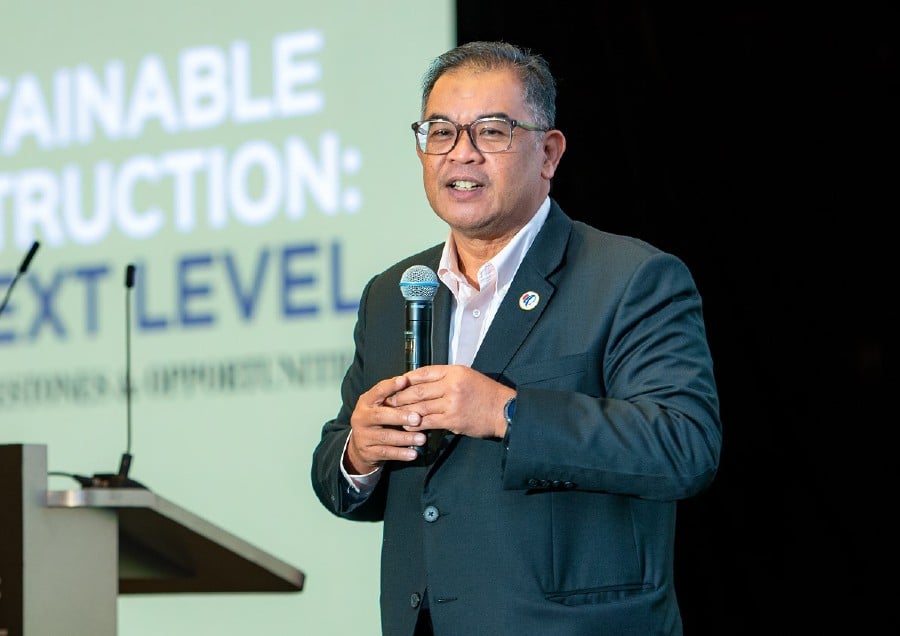By Sharen Kaur - August 12, 2024

KUALA LUMPUR: The adoption of sustainable construction practices is no longer optional but essential for the industry's continued growth, according to Datuk Sr Mohd Zaid Zakaria, chief executive officer of the Construction Industry Development Board (CIDB).
He underscored the construction sector's critical role in Malaysia's economy, contributing significantly to gross domestic product and employment.
Over the past few decades, sustainable construction in Malaysia has witnessed significant advancements, he said.
"Key milestones include the development of green building standards, the integration of renewable energy, the adoption of advanced technologies, and the incorporation of industrialised building systems (IBS)," he said at the Sustainable Construction Symposium held recently in Kuala Lumpur.
Dr. Ir Ho Hon Sang, president of the Real Estate & Housing Developers' Association (REHDA) Malaysia, noted that in 2023, the building and construction industry contributed RM56.7 billion to Malaysia's gross domestic product.
However, 24 per cent of the industry's carbon emissions stem from material consumption, followed by emissions from construction sites and transportation.
Given this reality, he stressed the importance of Malaysia's commitment to reducing carbon emissions by 45 per cent by 2030 and achieving carbon neutrality by 2050.
He also advocated for additional government incentives, such as financing, grants, and tax benefits, to support sustainability-related research and development.
Sr. Samuel Tan, a veteran property analyst, noted a surge in demand for eco-friendly building materials, attributing it to their potential for long-term cost savings through energy efficiency, reduced maintenance, and longer lifespan.
Speaking to Business Times, Tan explained that property developers and builders are increasingly adopting green building practices to meet market demands and attract eco-conscious clients.
"This trend is also fueled by growing environmental awareness, alongside stricter building codes and standards implemented by governments and regulatory bodies that promote sustainability and energy efficiency," Tan said.
He emphasised that sustainable building materials must meet several key criteria, including adherence to construction safety standards, ensuring no harm to occupants' health, reducing environmental impact, and maintaining long-term durability.
"Overall, the push for sustainability is significantly shaping the construction industry and driving the demand for green building materials," Tan said.
Meanwhile, YTL Cement Berhad s executive director of strategy and transformation, Rachel Yeoh, said the group has observed a strong demand for eco-friendly building materials and a significant shift towards sustainable construction practices.
In her welcome address at the symposium, she said that YTL Cement is looking at several collaborations to propel this transformation and meet the demand.
Yeoh highlighted the need for a unified effort across all sectors to support this transition.
One of the highlights of the symposium was a deep dive into the construction of Merdeka 118, showcasing how sustainable practices were integrated into every aspect of the project.
Tengku Datuk Abdul Aziz Tengku Mahmud, chief executive officer (CEO) of PNB Merdeka Ventures Sdn Bhd, presented a case study on the world's second-tallest building, detailing the engineering achievements behind the landmark skyscraper.
He noted that the construction incorporated pollution control technologies, including rainwater run-off management, indoor air quality (IAQ) and mould prevention plans, and waste management systems.
Notable sustainable features of the project include bike racks at parking bays to encourage alternative low-emission and fuel-efficient vehicle options, open spaces with extensive water features that create a cooler microclimate, and 100 per cent rainwater harvesting systems with non-potable water used entirely for irrigation.
Source: https://www.nst.com.my/business/corporate/2024/08/1090154/adoption-sustainable-practices-no-longer-optional-cidb
No comments:
Post a Comment